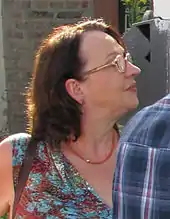Katja Lange-Müller
Katja Lange-Müller (born 13 February 1951) is a German writer living in Berlin.[1] Her works include several short stories and novellas, radio dramas, and dramatic works.

Katja Lange-Müller.
The daughter of Inge Lange, an East German party functionary, Katja Lange-Müller was born in Berlin-Lichtenberg. She was expelled from school at the age of 17 for "unsocialist" behavior. From an early age, she and her circle of friends were carefully watched by the Stasi. Prevented from attending college, she first learned to be a typesetter, and later worked as a nurse in a psychiatric clinic. At the age of 28, she was accepted to the "Johannes R. Becher" Literature Institute in Leipzig, marking the beginning of her career as a writer.[2]
Works
- Wehleid – wie im Leben, Frankfurt am Main 1986
- Kasper Mauser – die Feigheit vorm Freund, Köln 1988
- Verfrühte Tierliebe, Köln 1995
- Bahnhof Berlin, München 1997 (ed.)
- Die Letzten, Köln 2000
- Biotopische Zustände, Berlin 2001
- Preußens letzte Pioniere, Rheinsberg 2001
- Stille Post, Schwetzingen 2001 (with Hans Scheib)
- Vom Fisch bespuckt, Köln 2002 (ed.)
- Der süße Käfer und der saure Käfer, Berlin 2002 (zusammen mit Ingrid Jörg)
- Was weiß die Katze vom Sonntag?, Berlin 2002 (with Jonas Maron and Monika Maron)
- Die Enten, die Frauen und die Wahrheit, Köln 2003
- Der nicaraguanische Hund, Berlin 2003
- o.ä., München 2003 (with Traute Langner-Geißler)
- Böse Schafe, Kiepenheuer & Witsch, Köln, 2007
- Drehtür, Kiepenheuer & Witsch, 2016
Awards
- Ingeborg Bachmann Prize, 1986
- Alfred Döblin Prize, 1995
- Berlin Literature Prize, 1996
- Preis der Bestenliste des Südwestrundfunks, 2001
- Stadtschreiber-Literaturpreis of the city Mainz and the television station ZDF, 2002
- Roswitha Prize of the city Bad Gandersheim, 2002
- Kassel Literary Prize, 2005
References
- "Katja Lange-Müller". Massachusetts Institute of Technology. Retrieved January 10, 2011.
- "Katja Lange-Müller- Portrait". Litrix-German Literature Online. Retrieved January 10, 2011.
This article is issued from Wikipedia. The text is licensed under Creative Commons - Attribution - Sharealike. Additional terms may apply for the media files.